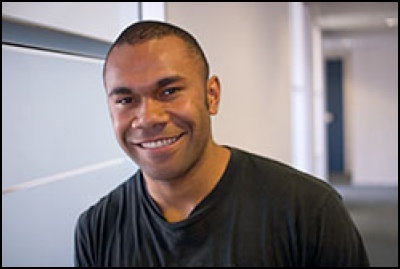Article – Thomas Leaycraft
On climate change: Whats the thing before you have a WTF moment? Thomas Leaycraft
On climate change: ‘What’s the thing before you have a WTF moment?’
Thomas Leaycraft
New Zealand needs to acknowledge that Pacific Island nations face “ecological holocaust” and “ecocide” thanks to climate change, says Dr Pala Molisa.

Dr. Pala Molisa, Image Credit: Victoria University of Wellington
Molisa, a lecturer in accounting at Victoria University, will be leading the open forum at the ‘In the Eye of the Storm’ Pacific climate change conference, which starts today. Dr. Molisa is also the MC of the conference.
“One of the reasons we call this … conference ‘In the Eye of the Storm’,” Molisa says, “is that the Pacific is one of the places where the impacts of climate change will be most severely felt and first felt. We’re going to lose islands – we’re going to lose whole countries – because of rising sea levels … The Pacific is one of the most vulnerable areas to these super storms and extreme weather events.”
The conference, which runs Monday-Wednesday this week, will provide an unconventional look at climate change. “It’s bringing amazing leaders and frontline activists from throughout the Pacific together,” says Molisa. The conference will discuss not only the immediate causes and effects of climate change but also the systemic issues behind it.
Though a lecturer in accounting, Molisa enlivens a traditionally “dry” field by “following the numbers” within social and economic frameworks, and looks at climate change through the lens of “the economic system powering it”.
Most people view climate change and poverty as completely unrelated issues, but Molisa sees them both as the byproducts of a broken system. “We can’t treat climate change as this standalone issue that’s separate from the mass extinction that’s going on in the oceans, that’s separate from deepening inequality.” These things all directly result from “this economic system which is at the same time powering catastrophic climate change”.
He points to the recently signed Trans-Pacific Partnership Agreement (TPPA) as an example of these systemic flaws, arguing that its provisions – such as those that allow companies to sue government over laws that damage their profits – could make it difficult to impose environmental regulations that are in the public’s interest. The TPPA, he says, “undermines our ability to respond effectively to these climate crises”.
Molisa is dissatisfied with the current volume and intensity of the national climate change discussion. “Our language isn’t up to the task,” he says. “This is a life and death issue, and yet the language of most politicians and public policy-makers is not life and death, it’s wait and see, incremental change, and it’s [using] very sanitised language.”
Molisa believes the lexicon for mainstream discussion has been stripped of the appropriate radical language. Words like “ecological holocaust”, “ecocide” and “biocide” should be part of society’s working vocabulary. “Actions are predicated on our understanding of reality, so language is fundamental,” he says. “It rained in December in the Arctic – you know, rain! That should be world news! … What’s the thing before you have a WTF moment? This is a crisis!”
The conference takes place against a backdrop of international efforts to reduce carbon emissions, most recently the COP 21 Paris Climate Conference, where much of the international community pledged to reduce their carbon emissions in an attempt to limit global warming to a further 1.5 degrees. Molisa applauds these recent efforts but still finds them “woefully inadequate”, noting that experts project that a catastrophic 2.7-3.5 degree rise could still occur even if all the current pledges are met. “It’s a start, but it’s only aspirational,” he warns. “We are pushing ahead at our current trajectory at breakneck speed.” Drastic action is needed before climate change reaches “runaway” levels – if indeed it hasn’t already, he says.
The ‘In the Eye of the Storm’ conference will look not only at the problems but also the solutions. While Pacific Island nations wield relatively little sway, they are not powerless in the international climate change discussion. As well as continuing to fight for tougher international standards – and, indeed, their survival – at international summits, the people of the Pacific, Molisa says, must be “the moral voices at the forefront of climate discussions around the world”.
To learn more about the In the Eye of the Storm Pacific Climate Conference visit http://www.victoria.ac.nz/vicpasifika/our-community/events/climate-conferenceAnd look for updates from the conference on Scoop
To read more from Dr. Molisa, visit his blog at http://blackstone.net.nz
Content Sourced from scoop.co.nz
Original url

